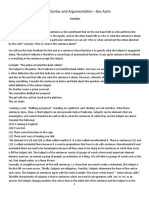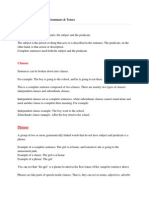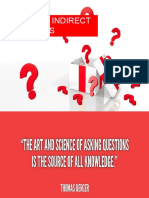0 ratings0% found this document useful (0 votes)
52 viewsLecture 8 - 1 Syntax
The document discusses the main parts of a sentence including the subject, predicate, object, attribute, and adverbial modifier. It describes the different types of each part and how they are expressed in sentences. For example, the subject can be a noun, pronoun, phrase or clause and denotes the entity performing the action. The predicate contains the main verb and can be simple, compound, verbal or nominal. It outlines secondary sentence parts like the direct or indirect object.
Uploaded by
Даша МусурівськаCopyright
© © All Rights Reserved
Available Formats
Download as PPT, PDF, TXT or read online on Scribd
0 ratings0% found this document useful (0 votes)
52 viewsLecture 8 - 1 Syntax
The document discusses the main parts of a sentence including the subject, predicate, object, attribute, and adverbial modifier. It describes the different types of each part and how they are expressed in sentences. For example, the subject can be a noun, pronoun, phrase or clause and denotes the entity performing the action. The predicate contains the main verb and can be simple, compound, verbal or nominal. It outlines secondary sentence parts like the direct or indirect object.
Uploaded by
Даша МусурівськаCopyright
© © All Rights Reserved
Available Formats
Download as PPT, PDF, TXT or read online on Scribd
You are on page 1/ 18
Lecture 8
The Main Sentence Parts
1. The subject and its types
2. The predicate and its type
2.1. The predicative in English
3.The object of the sentence
4. The attribute of the sentence
5. The adverbial modifier of the sentence
Parts of a sentence are commonly divided into
main and secondary. The main sentence
elements are the subject and the predicate. The
secondary parts of a sentence are the object,
the attribute and the adverbial modifier.
This subdivision is stipulated by the difference
in function. While the subject and the predicate
constitute the sentence (without them the
sentence wouldn’t exist), the secondary parts
serve to extend it. The secondary parts may or
may not be there, and if they are there, they
modify or complement either the subject or the
predicate, or each other.
The subject 1) denotes the thing (or person)
whose action or characteristics is represented by
the predicate; 2) is not dependent on any other
sentence part; 3) may be expressed in a number
of ways, namely:
– the noun – The book is on the table.
– the pronoun – He is here.
– the substantivised adjective – The rich also cry.
– the numeral – The two came in.
– the infinitive – To live is to love.
– the gerund – Swimming helps to relieve
backache.
– the phrase – For her to become a ballet dancer
required years of training.
– the clause – What you need is more time to relax.
There are two main types of subject: 1) the definite
subject denotes a specific thing, person, process,
quality, etc. – Jimmy entered. To go there was a
mistake. Her flexibility is an asset; 2) the indefinite
subject denotes a general or undetermined person,
thing or situation – They say ... You reap what you
sow. One can’t have everything.
There is also a formal (dummy) subject which fills the
subject position in place of the true subject that
follows the predicate. It is expressed by the pronoun
‘it’ ad adverb ‘there’, which have no lexical meaning
and are usually correlated with some words or
phrases in the sentence representing notional
subjects – It is sunny. There is no room for another
suitcase.
The predicate: 1) denotes the action or
property of the thing expressed by the subject;
2) is not dependent on any other part of the
sentence; 3) ways of expressing it are varied,
usually it is associated with a finite form of the
verb. Predicates may be classified in two ways:
structurally into simple and compound and
morphologically into verbal and nominal.
The simple verbal predicate is expressed by
a finite verb (synthetic or analytical form), a
phrasal verb; an idiom or a phrase denoting a
single action (have a look) – John works here.
John has been working here for a year. The
plane took off. They pay little heed to the
outside world.
The compound verbal predicate can be
divided into:
- the compound verbal modal predicate, which
represents the action expressed by the non-
finite form of the verb is considered as
obligatory, possible, desirable, etc. – I have to
go. We must stay.
- the compound verbal aspect predicate, which
expresses the beginning, end, duration or
repetition of the action denoted by the non-finite
form of the verb, e.g.: She never stops
complaining.
The simple nominal predicate
consists merely of a noun or an
adjective without a linking verb: He a
gentleman! It generally expresses
evaluation.
The compound nominal predicate
always consists of a linking verb and a
predicative. The linking verb is the
structural element of the predicate,
which joins the subject and the
predicative complement. Common
English linking verbs are as follows:
be ,seem,appear ,feel, look, smell,taste,
sound, become, get, go, grow, make,
turn, end up, remain, keep, stay, prove
She is my next door neighbour
I think it tastes awful
Her health is getting better
The girl will make a good teacher
She kept warm by jumping up and down
The predicative is the notional part of the compound
nominal predicate. It characterizes the person or
object expressed by the subject. The characterization
may concern the following:
1. The properties of the person or object (the state /
quality / quantity of it).
•The girl looked pretty.
•We are seven.
2. The identity of the person or object.
• That boy is my brother.
•Old Mr Clare was a clergyman.
•My aim is to finally graduate.
The predicative can be expressed by:
1. A noun in the common case or in the possessive case: Miss
Porter’s neighbour was a murderer. The bag was Alice's.
2. An adjective or an adjective phrase: Her eyes grew thoughtful.
You are full of surprises.
3. A pronoun: It’s me. She is somebody I will always love.
4. A numeral: He turned forty last year. He is the first.
5. An infinitive (or an infinitive phrase or construction): The next step
was to sign the document. The only thing you can do is kill him.
6. A gerund (or a gerundial phrase or construction): My sister’s
hobby is painting.
7. A participle or a participial phrase: He was surprised at the
reaction. The moment felt strangely soothing.
8. A prepositional phrase: She is on our side.
9. A stative: I was wide awake by this time.
10. An adverb: That’s enough!
11. A word-group: It is nine o’clock.
12. A clause: That’s what has happened.
The Secondary Sentence Parts
The object identifies who or what has been affected
by the predicate:
• the direct object – refers to some person or thing
directly affected by the verb – The child lost her
ball;
• the indirect object – refers to some person or
thing that is the recipient of the action – I told
them my news. The indirect object usually
precedes the direct object.
According to their morphological composition, indirect
objects are classified into:
• - prepositional, e.g.: An idea had occurred to me;
• - non-prepositional (or prepositionless), e.g.:
Don't forget to buy her a present on her birthday.
Personal pronoun ‘it’ can function as a formal
object when followed by a noun or adjective
modified by an infinitive, participle or a clause
– I find it ridiculous that everybody
sympathises with her.
Another type of object is a complex object
expressed by an objective with infinitive /
participle construction – It made me cry. I saw
her running away.
The attribute is a member of a sentence which expresses
the property, quality, or feature of a thing, person or
phenomenon. It can be expressed by:
•adjectives, e.g. Sandra was a beautiful girl.
•pronouns, e.g. Dan showed me his photos. (possessive
pronoun); Give me some apples, please. (indefinite
pronoun); These apples are delicious. (demonstrative
pronoun)
•numerals, e.g. I’ll come back in three weeks. (cardinal);
Wednesday is the third day of the week. (ordinal)
•nouns, in common case, e.g. It was a nice spring day; in
possessive case, e.g. Ann’s new flat is great!
•participles, Do you know that laughing girl? (participle I);
Can you see those dilapidated windows on the third floor?
(participle II)
•gerunds and gerundial phrases, e.g. Is there any chance
of seeing you again?
•prepositional phrases, e.g. Birds of a feather flock
together.
An attribute can either precede or follow the
noun it modifies, therefore there can be a
prepositive (a spectacular view) or
postpositive attribute (a cat sleeping on the
sofa).
The adverbial modifier is a secondary part of the
sentence serving to characterize an action or a
property as to its quality or intensity, or to indicate
the way an action is done, the time, place, cause,
purpose, or condition with which the action is
connected. They add extra information about the
situation and modify a part of the sentence
expressed by a verb, a verbal noun, an adjective or
an adverb.
There are several ways of classifying
adverbial modifiers:
(1) according to their meaning;
(2) according to their morphological
peculiarities;
Morphologically they can be expressed by:
• single adverbs – slowly, frankly
• adverb phrases – very slowly
• prepositional phrases – in the garden
• noun phrases – this morning
• infinitive – They stopped to have a look
• a single noun – We waited an hour.
Types of adverbial modifiers according to their meaning
include:
1)circumstantial adverbial modifiers:
• AM of time/duration/frequency: In the evening it still
rained.
• AM of place/direction: In London they stayed at their
friends’.
• AM of manner or attendant circumstances: Tessa
walked with quick short steps.
• AM of reason/cause: He had to retire because of ill
health.
• AM of purpose: I drove at a steady 50 mph so as to
save fuel.
• AM of result: The apples are not ripe enough to eat.
• AM of condition: I might never have got to university
but for you. Without faith there can be no cure.
• AM of concession: Despite all our efforts the
authorities decided to close the school.
2) qualitative adverbial modifiers:
• AM of comparison: Jason is much taller
than his father. His hands were as black
as soot. She behaves as if she were a
child. He speaks German like a native
speaker.
3) quantitative adverbial modifiers:
• AM of degree/measure: The girl was very
excited. It is pretty much the same story
I’ve heard. It is rather problematic.
1.Time will show whether I am right or wrong.
2. You could feel sympathy for a man who took so much delight in simple things.
3.They have met before, haven’t they?
4.As soon as I saw Susan I stopped noticing my surroundings.
5.Wish you a merry Christmas.
6.A painter has to be forbidding or people would like him more.
7. Deep wounds sometimes must be opened in order that they may be healed.
8.I can’t believe my eyes!
9.I am patient with you unless you annoy me with your words or actions.
10. The month was July, the morning fine, the glass-door was opened, through it
played a fresh breeze.
11. He is so weak physically that he can hardly move.
12.Stop playing that awful instrument!
13.He was white and exhausted, as if he had not slept for many nights.
14. The night was hot and quiet; the air moved when the wind stirred dry grass.
15. We have been discussing our next trip for ages.
16. What Mr.Pancks knew about their family, why he should trouble about them
were hard questions for him.
17 It was a nice little place and Mr. and Mrs.Smith were proud of it.
18. Do help me.
19. He apologized sincerely several times, yet he was sick at heart.
You might also like
- Storytown - Grade - 1 - Spelling - Practice - Book Belinda PDF100% (1)Storytown - Grade - 1 - Spelling - Practice - Book Belinda PDF110 pages
- b1 Relative Clauses and Relative PronounsNo ratings yetb1 Relative Clauses and Relative Pronouns3 pages
- Carte Gramatica Limbii Engleze in Scheme, CataragaANo ratings yetCarte Gramatica Limbii Engleze in Scheme, CataragaA70 pages
- Iii. The Predicate: Classification (According To The Structure and Meaning of The Predicate)100% (1)Iii. The Predicate: Classification (According To The Structure and Meaning of The Predicate)7 pages
- 2 The Main and Secondary Parts of A SentenceNo ratings yet2 The Main and Secondary Parts of A Sentence26 pages
- Prakticheskaya Grammatika Sovremennogo Angliyskogo Yazyka Khvedchenya Khoren Kryukovskaya 2005No ratings yetPrakticheskaya Grammatika Sovremennogo Angliyskogo Yazyka Khvedchenya Khoren Kryukovskaya 2005300 pages
- Sentences: Independent Clauses Act As Complete Sentences, While Subordinate Clauses Cannot Stand Alone and100% (1)Sentences: Independent Clauses Act As Complete Sentences, While Subordinate Clauses Cannot Stand Alone and9 pages
- The Simple Sentence The Principal Parts of The Sentence: Care For A Walk? Got A Match?100% (1)The Simple Sentence The Principal Parts of The Sentence: Care For A Walk? Got A Match?11 pages
- English Grammar in A Nutshell: I. The Parts of SpeechNo ratings yetEnglish Grammar in A Nutshell: I. The Parts of Speech4 pages
- Subject:: Simple Subject and Simple PredicateNo ratings yetSubject:: Simple Subject and Simple Predicate5 pages
- Subject:: Simple Subject and Simple PredicateNo ratings yetSubject:: Simple Subject and Simple Predicate5 pages
- Subject:: Simple Subject and Simple PredicateNo ratings yetSubject:: Simple Subject and Simple Predicate5 pages
- COMPLEX GRAMMATICAL UNITS_SUBJECT_PREDICATENo ratings yetCOMPLEX GRAMMATICAL UNITS_SUBJECT_PREDICATE14 pages
- University Goce Delcev Stip Faculty of Philology: M.A. Snezana KirovaNo ratings yetUniversity Goce Delcev Stip Faculty of Philology: M.A. Snezana Kirova18 pages
- ELEMENTS OF ENGLSIH STRUCTURE AND GRAMMAR (Part1)No ratings yetELEMENTS OF ENGLSIH STRUCTURE AND GRAMMAR (Part1)34 pages
- 7 Days to Grammar Excellence: How to Master English from Beginner to AdvancedFrom Everand7 Days to Grammar Excellence: How to Master English from Beginner to AdvancedNo ratings yet
- Phonology Is The Level That Deals With Language Units and Phonetics Is The Level That Deals With Speech UnitsNo ratings yetPhonology Is The Level That Deals With Language Units and Phonetics Is The Level That Deals With Speech Units31 pages
- The Ant and The Grasshopper: Unit ThreeNo ratings yetThe Ant and The Grasshopper: Unit Three20 pages
- Video I: Subject-Verb Agreement: The Movie, Including All The Previews, Takes About Two Hours To WatchNo ratings yetVideo I: Subject-Verb Agreement: The Movie, Including All The Previews, Takes About Two Hours To Watch3 pages
- Common Nouns Are Any Person, Place, or Thing. Common Nouns Are Not Capitalized. The City A Policeman That NewspaperNo ratings yetCommon Nouns Are Any Person, Place, or Thing. Common Nouns Are Not Capitalized. The City A Policeman That Newspaper23 pages
- English Grade 10 Term Notes For 2024 With Column For DateNo ratings yetEnglish Grade 10 Term Notes For 2024 With Column For Date12 pages
- Basic English Grammar in 23 Steps - English With LucyNo ratings yetBasic English Grammar in 23 Steps - English With Lucy18 pages
- Buku Bahasa Inggris 1a Sma Ma Kelas X BAB 1 S.D 5No ratings yetBuku Bahasa Inggris 1a Sma Ma Kelas X BAB 1 S.D 56 pages
- Active and Passive Voice Questions PDF For SSC Tier II Exams100% (2)Active and Passive Voice Questions PDF For SSC Tier II Exams13 pages
- Storytown - Grade - 1 - Spelling - Practice - Book Belinda PDFStorytown - Grade - 1 - Spelling - Practice - Book Belinda PDF
- Carte Gramatica Limbii Engleze in Scheme, CataragaACarte Gramatica Limbii Engleze in Scheme, CataragaA
- Iii. The Predicate: Classification (According To The Structure and Meaning of The Predicate)Iii. The Predicate: Classification (According To The Structure and Meaning of The Predicate)
- Prakticheskaya Grammatika Sovremennogo Angliyskogo Yazyka Khvedchenya Khoren Kryukovskaya 2005Prakticheskaya Grammatika Sovremennogo Angliyskogo Yazyka Khvedchenya Khoren Kryukovskaya 2005
- Sentences: Independent Clauses Act As Complete Sentences, While Subordinate Clauses Cannot Stand Alone andSentences: Independent Clauses Act As Complete Sentences, While Subordinate Clauses Cannot Stand Alone and
- The Simple Sentence The Principal Parts of The Sentence: Care For A Walk? Got A Match?The Simple Sentence The Principal Parts of The Sentence: Care For A Walk? Got A Match?
- English Grammar in A Nutshell: I. The Parts of SpeechEnglish Grammar in A Nutshell: I. The Parts of Speech
- University Goce Delcev Stip Faculty of Philology: M.A. Snezana KirovaUniversity Goce Delcev Stip Faculty of Philology: M.A. Snezana Kirova
- The Briefest English Grammar and Punctuation Guide Ever!From EverandThe Briefest English Grammar and Punctuation Guide Ever!
- 7 Days to Grammar Excellence: How to Master English from Beginner to AdvancedFrom Everand7 Days to Grammar Excellence: How to Master English from Beginner to Advanced
- Phonology Is The Level That Deals With Language Units and Phonetics Is The Level That Deals With Speech UnitsPhonology Is The Level That Deals With Language Units and Phonetics Is The Level That Deals With Speech Units
- Video I: Subject-Verb Agreement: The Movie, Including All The Previews, Takes About Two Hours To WatchVideo I: Subject-Verb Agreement: The Movie, Including All The Previews, Takes About Two Hours To Watch
- Common Nouns Are Any Person, Place, or Thing. Common Nouns Are Not Capitalized. The City A Policeman That NewspaperCommon Nouns Are Any Person, Place, or Thing. Common Nouns Are Not Capitalized. The City A Policeman That Newspaper
- English Grade 10 Term Notes For 2024 With Column For DateEnglish Grade 10 Term Notes For 2024 With Column For Date
- Basic English Grammar in 23 Steps - English With LucyBasic English Grammar in 23 Steps - English With Lucy
- Active and Passive Voice Questions PDF For SSC Tier II ExamsActive and Passive Voice Questions PDF For SSC Tier II Exams





























































































